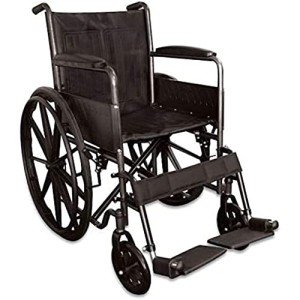Bariatric Folding Wheelchair
Bariatric folding wheelchairs are designed to accommodate users of a bigger size. They feature a greater weight capacity than standard designs and are developed with enhanced materials for added stability and longevity.
Nevertheless, not everyone with a high body mass index (BMI) needs a bariatric chair as numerous fall within the safe weight limits of basic wheelchairs.
Size and Weight Capacity

Bariatric wheelchairs have wider seats and are created to accommodate bigger people, usually weighing approximately 500 pounds. These chairs have a durable frame made from enhanced products like steel and are built with larger wheels that offer more weight distribution and maneuverability for bigger users.
When comparing bariatric wheelchairs, make certain the weight capacity is listed as static or active load. Static weight capacity describes just how much a chair can hold when it's sitting still, while active load capacity is figured out by putting the chair through a drop test that replicates someone plopping down into the seat.
Standard wheelchairs are widely produced and developed for users with average body weights, making them more affordable than bariatric models. Medicare and other insurance coverages might only cover a limited variety of bariatric wheelchairs, depending on a patient's medical needs and medical diagnosis. These chairs are likewise more pricey than standard wheelchairs due to the fact that they have a specialized style and building and construction. Nevertheless, they are a great option for clients with a vast array of medical conditions that need a more comfy travel experience.
Seat Dimensions and Comfort
Unlike basic wheelchairs, bariatric models have larger seats to accommodate larger individuals. They also have more robust frames and big, durable wheels that can hold up against higher loads. They can be personalized with numerous seating options and devices based upon the user's needs and choices.
When comparing wheelchairs, it's essential to take a look at their weight capacities under both fixed and active load ratings. Fixed load refers to the chair's optimum capacity when it's sitting still, while active load procedures how much a wheelchair can securely hold when somebody sits in it and walks around. Some manufacturers might also show the weight limit of a bariatric wheelchair in kilograms, which is often more accurate since it takes into account the average bodyweight of a person who uses the chair.
In addition to a broad seat, a bariatric folding wheelchair ought to have adjustable padded leg rests to assist users stay comfortable while taking a trip. It should likewise have flip up armrests that can be vacated the way to prevent getting in the user's method when they wish to stand up or transfer to another surface area.
If you're considering a bariatric wheelchair, ask a doctor or mobility professional for recommendations. learn more can examine your requirements, suggest the right chairs for you, and guide you through the process of purchasing one. They can also help you compare features and rates to discover a wheelchair that best fits your spending plan. They can even provide recommendations on other mobility solutions such as power placing systems and iLevel seating.
Weight and Portability
While basic wheelchairs are normally economical, bariatric chairs tend to be a bit more pricey. This is because of their specialized style and building and construction, in addition to the reality that they're a little much heavier than their equivalents.
If you're concerned about the expense of a bariatric chair, speak to a doctor or mobility specialist. They'll have the ability to assess your special needs and figure out which kind of wheelchair is the best fit for you. They can likewise advise wheelchair devices based upon your specific requirements. In addition, if you're aiming to get your wheelchair covered by insurance, such as Medi-Cal, they can assist you on the actions associated with this process. For more information, read our guide to wheelchair insurance protection. Then, you can start your journey towards independent mobility.
Manoeuvrability and Handling
Picking the ideal wheelchair can be an essential choice for those with limited mobility. Bariatric wheelchairs provide increased weight capabilities and are developed to accommodate bigger individuals. They generally include larger wheels, broader armrests and seating options, and are sturdier than standard wheelchairs.
When picking a bariatric wheelchair, think about the individual's specific needs and the environment in which they will be utilizing it. Evaluate the weight capacity and seat measurements, and search for adjustable features like cushioned raising leg rests to support convenience and ease of transfer.
Figure out whether the wheelchair appropriates for manual or powered usage. For added versatility, a bariatric folding wheelchair can be quickly folded and compressed for storage or transport. This makes them a perfect option for those with restricted home area or who require to travel long ranges. The wheelchairs also include puncture evidence wheels to ensure toughness and low upkeep. Appropriate for users up to a maximum of 35 stone.
